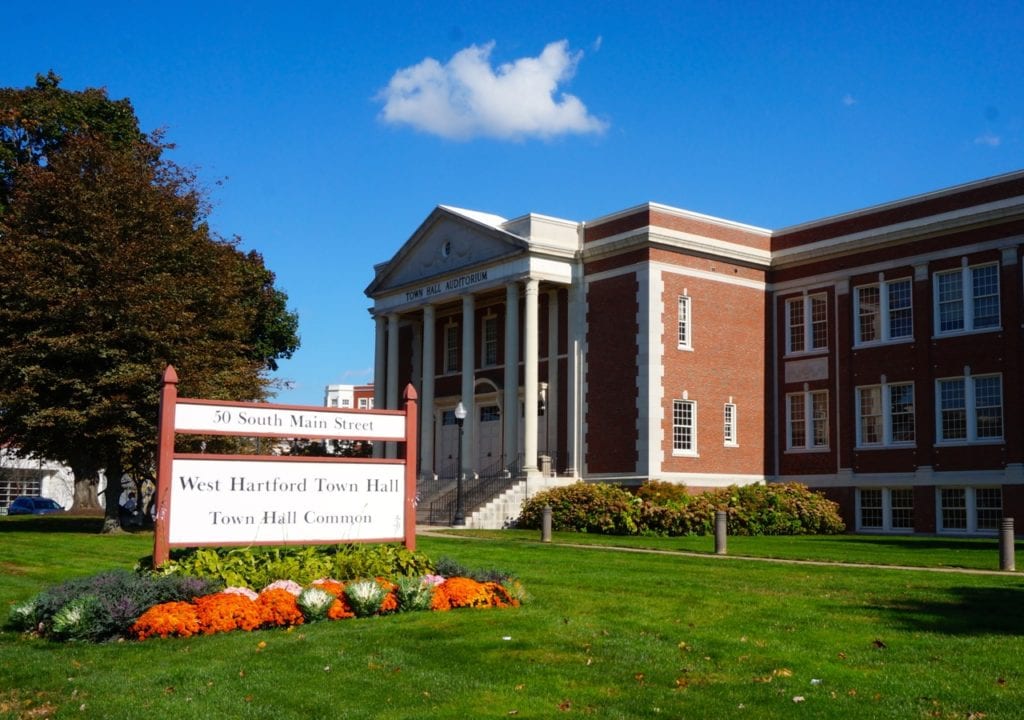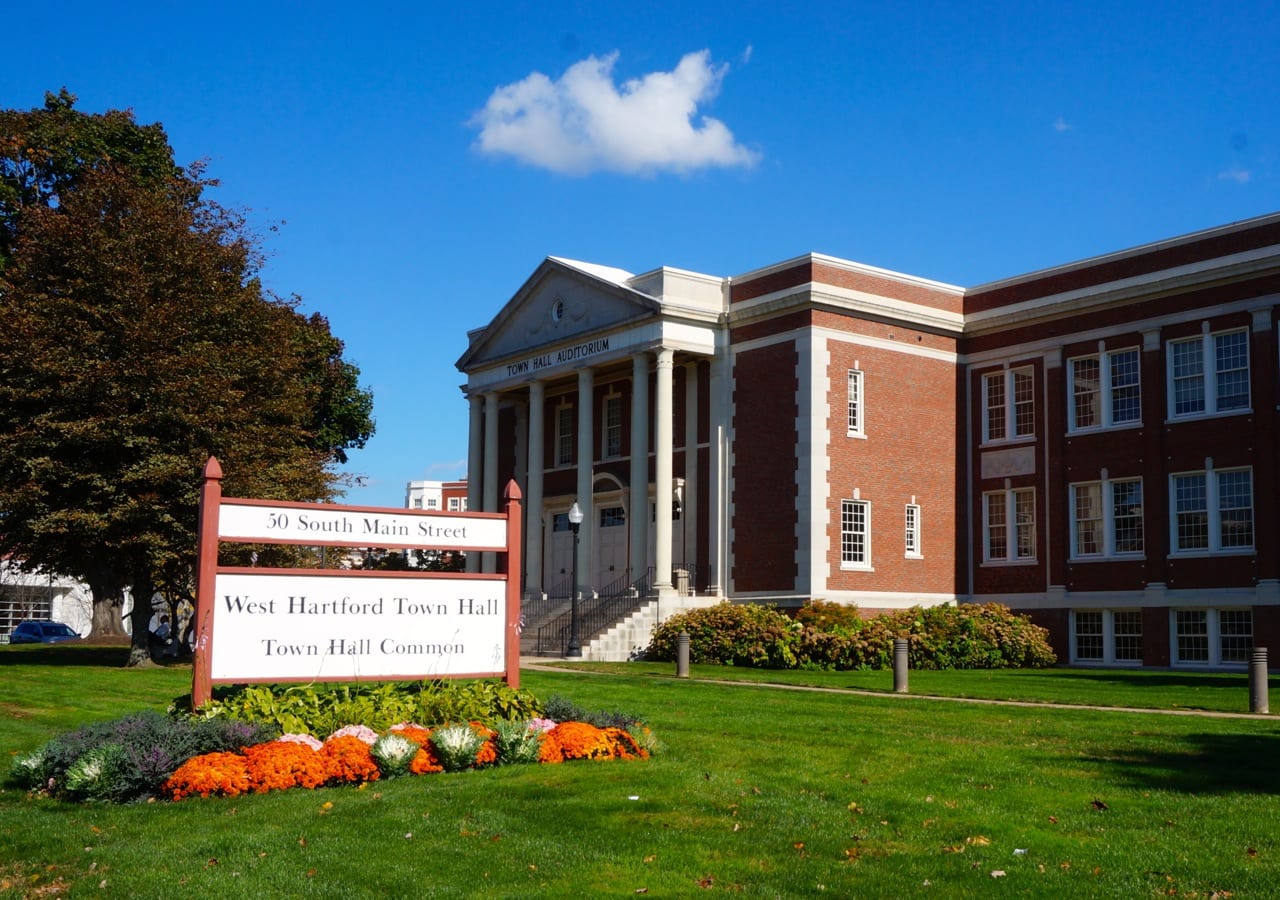The measure was passed by the West Hartford Town Council in a 6-2 vote Tuesday night, with limited bipartisan support.

West Hartford Town Hall. Photo credit: Ronni Newton
[Editors note: This article first appeared in this week’s edition of The West Hartford Press. To read the full edition, visit TurleyCT.com/west-hartford-press/]
By Abigail Albair, West Hartford Press Editor
The West Hartford Town Council sent a message to the Metropolitan District Commission Tuesday night when it approved a resolution highlighting a “fundamental flaw in the way the MDC sewer services are funded” as evidenced, the document said, by the Commission’s 2017 budget.
The resolution was approved Jan. 24 in a 6-2 vote – with Judy Casperson absent – following a heated discussion. It further criticizes the MDC for failing to undertake necessary planning to address the potential impacts to its 2017 budget or bond issue as a result of the financial crisis in the city of Hartford until it was too late to mitigate the fallout.
West Hartford is currently bracing for impact by way of its MDC ad valorem tax.
The tax on member towns, along with resident water bills, funds MDC operations to provide both clean water and sewage treatment. In the fiscal year 2017 budget adopted last spring, the tax increased 6.2 percent, or $526,350, to just shy of $9 million at $8,956,500. The tax for fiscal year 2018, which begins July 1, will be $11,325,288, according to numbers given to Town Manager Ron Van Winkle by the MDC, for a total increase of $2,368,788. A portion of that increase – roughly $1.77 million – is a reserve payment to cover the possible shortfall should Hartford default on its payments. The remainder is the usual operating increase.
Payments to the MDC are made quarterly, and the reserve payment would be returned to the other member towns if there is no default on the part of the city of Hartford.
The money will come from a budget surplus West Hartford is running this year, Town Manager Ron Van Winkle said.
The capital city is responsible for 26 percent of the ad valorem tax on member towns and has informed the MDC that, while it should be able to make its payments in the first half of the year, it may not be able to make its quarter three and quarter four payments.
Although the MDC has in that instance “the authority to execute against the goods and estate of the inhabitants of such defaulting member town,” the resolution explains that the MDC must continue operations during the timely collection process.
Addressing whether or not a reserve payment in the ad valorem tax is legal under the MDC charter to avert any resulting cash crisis became a point of contention during the evening’s discussions.
Council members stressed displeasure with the fact that they felt their “hand was forced,” as a bond issue was impending and the reserve payment was required for that to move forward.
In the resolution adopted, it is outlined that “the additional levy adopted for 2017 should not become an annual mechanism, but should be viewed as a one-time solution to a sudden and unanticipated problem which member municipalities agree to participate in because of the serious and detrimental consequences inherent in the alternatives.”
Additionally, the resolution calls upon the MDC to work with member municipalities as well as the Connecticut General Assembly to identify potential charter revisions, which would address the structural deficiencies in the manner by which the MDC funds sewer services.
Possible revisions outlined in the resolution include revising and replacing the ad valorem tax mechanism with a user-fee based system similar to that which is used to fund the provision of water services, allowance for the MDC to undertake borrowing if a municipality defaults on any of its ad valorem payments to help it withstand short-term revenue losses, and clarification and enhancement of the MDC’s collection powers in the event of a failure by a member town to pay the tax.
During the public comment portion of Tuesday’s meeting, Brendan Fox, the assistant district counsel for the MDC, “respectfully disagreed” with the resolution’s criticism of how the MDC handled Hartford’s financial situation.
“We did not have many options except the one we pursued,” he said.
The MDC would also like to see additional options created, he said, which would require an amendment to the MDC charter by way of a referendum or act of the General Assembly.
With regard to the suggestion of a switch from the ad valorem tax to a user-fee based system, Fox said a cautious approach should be taken.
“My only comment is it is a very complex mechanism that has been in place for 89 years,” he said. “There are a number of tangential effects caused by a switch to a user-fee from the ad valorem. It’s not for me to say if it should be done, that’s for the policy makers, but it is a subject matter that should be carefully studied before any decisions are made.”
Resident Judy Allen also spoke during the public forum, asking that additional means of representation on the MDC board for ratepayers be explored, as well as clarification of commissioner’s responsibilities be provided, and also asked that the MDC be encouraged to hold hearings prior to its annual budget adoption.
During the Council’s subsequent discussion, Minority Leader Denise Hall thanked Allen for her comments and called for her suggestions to be incorporated into the resolution before it was approved, though, ultimately, the resolution was unchanged and Mayor Shari Cantor termed it a “working document” – more of an outline of concerns and suggestions that can be used as conversations develop going forward.
Hall said that, while she understands the difficulty in opening up a charter for revision, she feels changes were due long ago, particularly given the fact that the MDC has undertaken major projects, such as the Clean Water Project.
Before such a project, she said, the charter should have been examined to be sure the MDC had the proper authorities in place to handle borrowing needs or issues that could cause cash shortfalls.
“I appreciate the fact that charter change is not an easy task, but given the magnitude of the projects and … the fact that West Hartford continues to take on a disproportionate amount of the MDC budget,” the discussion should have been had before the issue of Hartford bankruptcy was raised, she said.
While her Republican colleagues voted against the resolution, Hall ultimately voted in favor, saying that she felt the discussion of the resolution was beneficial and that it would be stronger with bipartisan support.
Dissension among Council members
Republican Chris Barnes argued that the resolution didn’t go far enough to reach the heart of the problem with the MDC, which, he said, was that the buck is being passed from Hartford and the MDC onto other member towns.
“The MDC has effectively turned this into an ‘other-member town’ issue, and it’s not a West Hartford issue. We have eight member towns and we’re all required to pay our share,” he said.
He argued that the MDC should have told Hartford it needed to voluntarily set aside the money to make its payments, or force the city to do so via a court order.
Barnes called upon his colleagues to reject the resolution as proposed and rework it to say that the MDC does not have the authority under its charter to impose an ad valorem tax and direct it to find other avenues going forward.
Democrat Dallas Dodge disagreed with Barnes’ assertion that Hartford could have been compelled to set aside funds to make its payments.
“Going to the city of Hartford to say you need to set aside money for something that might never happen was not an option,” he said. “[The reserve payment] was the only option we had.”
Though he agreed that serious examination must be given to the MDC charter, necessary changes must be made in the General Assembly and will not be made at the Council table, he said.
“If the MDC does not have the authority to make us pay the reserve fund, then why are we paying the reserve fund?” Ben Wenograd asked, adding that he had a fundamental problem taking the position in a resolution, as Barnes suggested, against the MDC’s authority and then “voluntarily” making its reserve payment.
“I think the point of the original resolution that we proposed … was to ensure that the MDC was confined to its legal authority because, indeed, [a reserve payment] is not in the charter,” Chris Williams said in response.
He reiterated that the only instance in the charter pertaining to default on the part of a member town outlines that the payment must be garnered by way of personal property tax to ratepayers in the defaulting member town.
“What our resolution is intended to do is say, ‘MDC, we will not tolerate lawlessness, you must be confined to your charter,’” Williams said, and argued that the resolution must send a message to Hartford that payment to the MDC should be one of the city’s primary concerns.
“We will make this one payment, one time, because you put us on the spot so recklessly … but no more, never again,” he said.
After asking town corporation counsel Pat Alair to clarify the “archaic” language of the MDC charter, which he noted does make reference to a “contingency fund,” Dodge said the “murkiness” of the issue makes creating a process to avoid such problems in the future most important.
“Reasonable minds can disagree as to whether or not [a reserve payment] is allowed,” he said.
Alair, for his part, said he does believe the MDC has the authority to levy the tax as it sees fit based on its estimate of the revenue it expects to collect, which is what it has done with the reserve payment as it is to be used for expenses within the fiscal year that it levies the tax.
Although Deputy Mayor Leon Davidoff called for his colleagues to present a “unified front” on behalf of its residents in sending a message to the MDC, the vote was divided in the end.
“This evening we’re presented with a resolution. We may not all agree with all the whereases or all the items that are mentioned here. … I don’t disagree with what Mr. Williams or Mr. Barnes have alluded to, but we need to find some common ground,” he said. “An 8-0 vote sends a much stronger message to the MDC this evening than a 5-3 vote. What we need to show our residents is that we are unified as an elected body.”
“This issue here this evening, with respect to a member town potentially defaulting on its obligation to make its payments, is probably the most severe one that could have the most severe consequences on all our residents,” he added. “It’s not about partisan politics, it’s about doing what’s right for West Hartford.”
Barnes disagreed with the summation, responding that the resolution does not accomplish, in his opinion, the goal of sending a message to the MDC that the council will protect its residents’ rights.
“It’s not everything,” Cantor said of the resolution. “But, we are going to be meeting with our member towns again and I would like to have a tool to work off of to say … these are some of our concerns.”
“This really does hurt us. It’s something that concerns us … and we want to protect our residents and we want to have a plan going forward,” she said.
Like what you see here? Click here to subscribe to We-Ha’s newsletter so you’ll always be in the know about what’s happening in West Hartford!








[…] West Hartford Town Council Adopts Resolution Criticizing MDC […]